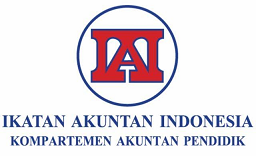LAMIKRO APPLICATION IN PREPARING MSME FINANCIAL REPORTS BASED ON SAK EMKM
Abstract
This study aims to determine the effectiveness of the LAMIKRO Digital Application in preparing SAK EMKM-based financial statements at Salsabila Leather Bags. This type of research uses a qualitative method using a Field Research approach. Data is obtained from primary data sources and secondary data. Data analysis is done through data collection, data reduction, data presentation and conclusion drawing. The results of this study prove that leather bag MSMEs consider financial reports difficult, MSME owners do not have web-based or android-based accounting applications and still make inconsistent financial records. This research contributes to helping MSMEs prepare financial reports according to standards by using the LAMIKRO application. The use of the LAMIKRO application can help MSMEs to make financial reports based on standards, so that MSMEs can find out the financial position report, income statement, and notes to financial statements in real time. The results of this study also indicate a high commitment from MSME actors to use the LAMIKRO application sustainably.
Downloads
References
Astiyah, A., & Budiantara, M. (2023). Faktor-Faktor yang Mempengaruhi Minat Pelaku UMKM untuk Menggunakan Aplikasi Akuntansi Berbasis Seluler di Dusun Bugel Sampang Kabupaten Cilacap. Jurnal Akuntansi dan Keuangan (JAK), 28(1), 76-86. doi:https://doi.org/10.23960/jak.v28i1.792
Bhaskaran, R. K., Sujit, K., & Mongia, S. (2023). Linkage Between Performance and Sustainability Initiatives in Banking Sector–An Empirical Examination. International Journal of Productivity and Performance Management, 72(1), 200-225. doi:https://doi.org/10.1108/IJPPM-07-2020-0385
Dwijayanti, N. M. A., Karmana, I. W., & Trisnadewi, K. S. (2024). Mendalami Kesiapan UMKM dan Relevansi SAK EMKM di Era Industri 4.0. Owner: Riset dan Jurnal Akuntansi, 8(4), 4596-4601. doi:https://doi.org/10.33395/owner.v8i4.2442
Herawati, N. T., Kurniawan, P. S., Sujana, E., Dewi, P. E. D. M., & Dewi, L. G. K. (2020). Pemanfaatan Financial Technology dalam Pengelolaan Keuangan Usaha Mikro dan Kecil. CARADDE: Jurnal Pengabdian Kepada Masyarakat, 2(2), 179-186. doi:https://doi.org/10.31960/caradde.v2i2.281
IAI. (2021). Kode Etik Akuntan Indonesia. Jakarta: Ikatan Akuntan Indonesia.
Irawan, W., & Wardhani, R. S. (2021). Economic Entity Concept, Penata Keuangan dan Aplikasi Lamikro Era Industri 4.0 (UMKM Provinsi Kepulauan Bangka Belitung). Jurnal Akuntansi, 13(1), 23-45. doi:https://doi.org/10.28932/jam.v13i1.3001
Kirowati, D., & Amir, V. (2019). Implementasi Standar Akuntansi Keuangan Implementasi Standar Akuntansi Keuangan Entitas Mikro, Kecil, dan Menengah SAK EMKM pada Laporan Keuangan di Era Revolusi Industri. Jurnal AKSI (Akuntansi dan Sistem Informasi), 4(1), 48-58. doi:https://doi.org/10.32486/aksi.v4i1.48
Kusumawardani, N. (2019). Faktor-Faktor yang Mempengaruhi Penyusunan Laporan Keuangan Berdasarkan Standar Akuntansi Keuangan Entitas Tanpa Akuntabilitas Publik (SAK ETAP) pada Usaha Barbershop. Jurnal Akuntansi dan Keuangan (JAK), 24(2), 68-83. doi:https://doi.org/10.23960/jak.v24i2.53
Muqorobin, M. M., Fauzan, S., & Putri, D. M. (2021). Lamikro Berbasis Android: Solusi Mudah Bagi Fasilitator dan Komunitas Usaha Mikro Preman Super di Kota Malang. Jurnal Graha Pengabdian, 3(4), 352-360. doi:https://doi.org/10.29303/abdiinsani.v11i3.1796
Novitasari, Agha, R. Z., & Redyanita, H. (2023). Implementasi SAK EMKM dalam Penyusunan Laporan Keuangan Berbasis Cloud di Era Revolusi Industri 4.0 (Studi Kasus pada UMKM AY&MA Collection). Prosiding Seminar Nasional Penelitian dan Pengabdian Kepada Masyarakat, 1(1).
Paton, W. A. (1962). Accounting Theory: with Special Reference to the Corporate Enterprise New York: The Ronald Press Company.
Salampessy, Z., & Juneferstina, M. (2023). Menyelami Konsep Kesatuan Usaha dalam Teori-Teori Akuntansi. Jurnal Administrasi Terapan, 2(1), 218-224. doi:https://doi.org/10.31959/jat.v2i1.1789
Sembiring, S. I. O. (2020). Penerapan Strategi Bersaing UMKM dan Implikasinya Terhadap Kinerja Usaha. Jurnal Akuntansi dan Keuangan (JAK), 25(1), 81-95. doi:https://doi.org/10.23960/jak.v25i1.241
Seseli, E. M. I., Risakotta, K. A., & Bawono, A. (2023). The Role of Accounting Digitization in Entrepreneurial Success in West Java: Quantitative Study of Efficiency, Accuracy, Cost Reduction, Customer Satisfaction, and Data Security. The Es Accounting and Finance (ESAF), 1(2), 82-94. doi:https://doi.org/10.58812/esaf.v1i02.65
Sugiyono. (2013). Metode Penelitian Pendidikan Pendekatan Kuantitatif, Kualitatif dan R&D. Bandung: Alfabeta.
Suratno, A. W. A., Astuti, D. S. P., & Harimurti, F. (2020). Penerapan Aplikasi Akuntansi LAMIKRO Berdasarkan Sak EMKM Pada Usaha Mikro Kecil Menengah (Studi Kasus Pada Gilapolos). Jurnal Akuntansi dan Sistem Teknologi Informasi, 16(4), 70-82. doi:https://doi.org/10.33061/jasti.v16i4.6224
Susilowati, K. D. S., Riwajanti, N. I., Amalia, R., Muwidha, M., & Purnomo, H. (2021). Pelatihan Akuntansi Terapan Berbasis Android pada UMKM Anggota KADIN Kota Malang. Ekobis Abdimas: Jurnal Pengabdian Masyarakat, 2(1), 10-17. doi:https://doi.org/10.36456/ekobisabdimas.2.1.3899
Syafis, K. S. (2022). Analisis Penerapan Informasi Pengungkapan CSR Beserta Faktor-Faktor yang Mempengaruhinya Berdasarkan Teori Agency, Legitimasi, Stakeholder dan Teori Kontrak Sosial. Jurnal Akuntansi dan Keuangan (JAK), 27(2), 113-119. doi:https://doi.org/10.23960/jak.v27i2.576
Undang-undang (UU) Nomor 11 Tahun 2020 tentang Cipta Kerja.
Undang-undang (UU) Nomor 20 Tahun 2008 tentang Usaha Mikro, Kecil, dan Menengah.
Wati, M. S. W., & Adiputra, I. M. P. (2021). Efektivitas Penggunaan Aplikasi Lamikro pada Pengelolaan Keuangan Usaha Mikro Kecil dan Menengah (UMKM) di Kecamatan Buleleng. JIMAT (Jurnal Ilmiah Mahasiswa Akuntansi) Undiksha, 12(3), 704-716. doi:https://doi.org/10.23887/jimat.v12i3.34448

This work is licensed under a Creative Commons Attribution-NonCommercial-ShareAlike 4.0 International License.
Jurnal Akutansi dan Keuangan allows readers to read, download, copy, distribute, print, search, or link to the full texts of its articles and allow readers to use them for any other lawful purpose. The journal allows the author(s) to hold the copyright without restrictions. Finally, the journal allows the author(s) to retain publishing rights without restrictions
Authors are allowed to archive their submitted article in an open access repository
Authors are allowed to archive the final published article in an open access repository with an acknowledgment of its initial publication in this journal







